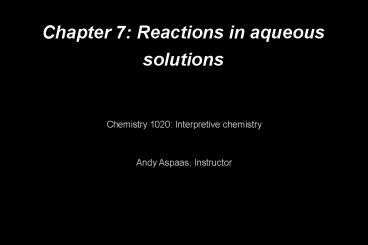Chapter 7: Reactions in aqueous solutions - PowerPoint PPT Presentation
Title:
Chapter 7: Reactions in aqueous solutions
Description:
Chapter 7: Reactions in aqueous solutions Chemistry 1020: Interpretive chemistry Andy Aspaas, Instructor – PowerPoint PPT presentation
Number of Views:108
Avg rating:3.0/5.0
Title: Chapter 7: Reactions in aqueous solutions
1
Chapter 7 Reactions in aqueous solutions
Chemistry 1020 Interpretive chemistry Andy
Aspaas, Instructor
2
Reactions in which a solid forms
- Precipitation formation of a solid in a chemical
reaction (a precipitation reaction) - Precipitate the solid that forms
- Whether a precipitate forms or not depends
strongly on the solubility of that compound
(ability of a compound to dissolve in water)
3
Process of ionic compounds dissolving in water
- If an ionic compound dissolves in water, its
positive and negative ions separate and move
independently - Strong electrolyte an ionic compound whose ions
separate completely when dissolved in water, and
therefore conducts electricity - Molecular substances like sugar are not strong
electrolytes even though theyre soluble in water - Electrolytes must be made of ions!
4
Precipitation reactions
- When two strong electrolytes are mixed together,
all the ions are mixed - Any /- combinations of ions in the solution can
form products - To predict possible products of a precipitation
reaction, separate the reactants into their
component ions, and swap partners to form new
products - AgNO3(aq) KI(aq) ? ?
5
Precipitation reactions
- But simply predicting the products of a
precipitation reaction does not predict whether a
visible reaction will occur or not - You must determine the solubility of the products
- If all products are soluble in water, no reaction
will have occurred - If one or more products are insoluble, they are
the precipitate that has formed
6
Solubility rules
- A soluble compound is one which readily and
completely dissolves in water (the ions separate
and disperse) - An insoluble or slightly soluble compound is
one which, for the most part, does not dissolve
in water - Solubility rules allow us to predict whether a
compound is soluble or insoluble
7
Solubility rules
- Predict the solubility
- CaSO4
- MgCl2
- NaOH
- LiOH
- CuSO4
- AlPO4
- AgI
- NH4C2H4O4
8
Using solubility rules to predict precipitation
- Solubility rules can be used to assign phase
labels to all constituents of a reaction - Insoluble compounds are solid (s)
- Soluble compounds are aqueous (aq)
- If all compounds in a reaction are aqueous, no
reaction has occurred (NR)
9
Predict the products
- NH4Cl H2SO4 ?
- K3PO4 AlCl3 ?
- CuSO4 KOH ?
- Sodium carbonate and barium nitrate
- Ammonium sulfide and cobalt(II) chloride
- Sodium hydroxide and iron(III) chloride
10
Describing aqueous reactions
- Molecular equation show ionic formulas of all
reactants and products - Complete ionic equation any soluble (aq)
compound is shown as its component ions - Aqueous sodium chloride
- NaCl(aq) in molecular equation
- Na(aq) Cl(aq) in complete ionic equation
- Other compounds (s), (l), or (g) remain as they
would in molecular equation
11
Net ionic equations
- Spectator ions ions which do not participate in
the reaction - Exist as ionic form on both products and
reactants side of the equation - Net ionic equation ionic equation with no
spectator ions
12
Practice writing equations
- Write the molecular, complete ionic, and net
ionic equations for the following reactions - Mixture of potassium sulfide and calcium nitrate
- Mixture of nickel(II) sulfate and barium chloride































